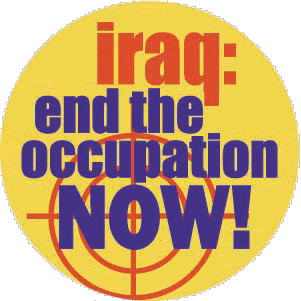Iraq: All FUBAR and Refugees Have Nowhere to Go
[Crossposted from Docudharma]
Today brought the news that Syria Shuts Main Exit From War for Iraqis:
DAMASCUS, Syria, Oct. 20 - Long the only welcoming country in the region for Iraqi refugees, Syria has closed its borders to all but a small group of Iraqis and imposed new visa rules that will legally require the 1.5 million Iraqis currently in Syria to return to Iraq.1.5 million refugees are going to have to go back. Go back to what exactly?
A lack of potable water.
A lack of electricity.
Massive unemployment.
Lack of adequate medical services.
Hundreds being forced to scavenge for food.
A broken country, where hope has sometimes been in short supply.
All that said, there does seem to be good news coming out of Iraq. This today from IRIN, the humanitarian news and analysis service of the UN Office for the Coordination of Humanitarian Affairs, IRAQ: Violence-related deaths drop 'remarkably', say authorities and UN:
According to the ministry's statistics, between January and the end of September 2007, the number of violent deaths involving civilian, police and military in all of Iraq was about 7,100, against 27,000 in the same period of 2006.That is still an astonishing amount of violence, but it is good news nonetheless, although neither the Dems nor the Rs nor the trad med seem to know what to make of it as LithiumCola so astutely noted yesterday in How We Should Understand the Relative Calm in Iraq (a must-read!).
According to Muhsin, the average number of dead bodies sent to Baghdad's main morgue just over a year ago was between 100 and 150 a day. Now, it is no more than 10 bodies a day, and about 50 percent of them are dying in normal circumstances.
Despite this drop in violence, however, the refugee crisis in Iraq has only worsened this year and is now at a critical level, according to the UNCHR.
Incessant violence throughout Iraq is forcing an estimated 60,000 people to leave their homes every month, presenting the international community with a humanitarian crisis even larger than the upheaval aid agencies had planned for during the 2003 war.With Syria's new restrictions in place, including sending back 1.5 million refugess, the refugee crisis is only going to become more urgent.
UNHCR estimates that more than 4.4 million Iraqis have left their homes. Of these, some 2.2 million Iraqis are displaced internally, while more than 2.2 million have fled to neighbouring states, particularly Syria and Jordan. Many were displaced prior to 2003, but an increasing number are fleeing now. In 2006, Iraqis had become the leading nationality seeking asylum in Europe.
And the violence may grow significantly. Today brought bellicose news from Turkey: Turkish PM: 'We Will Attack Kurdish Rebels in Iraq'. And this is the region that had been enjoying the most peace and stability.
Turkey will launch military action against Kurdish rebels in northern Iraq despite frantic appeals for restraint from America and Nato, its Prime Minister has told The Times.Today also brought news of multiple civilian deaths caused, by U.S. forces, although the military disputes this claim.
Speaking hours before the PKK, the Kurdish Workers' Party, killed at least 17 more Turkish soldiers yesterday, Recep Tayyip Erdogan said that Turkey had urged the US and Iraqi governments repeatedly to expel the separatists but they had done nothing. Turkey's patience was running out and the country had every right to defend itself, he said. "Whatever is necessary will be done," he declared in an interview. "We don't have to get permission from anybody."
BAGHDAD, Oct. 21 - American forces on Sunday came under heavy fire in three locations in Sadr City, the Shiite enclave in Baghdad, and returned fire, killing 49 militants, according to an American military official and a military statement about the episode.This in Sadr City, despite Al-Sadr's cessation of operations against U.S. forces and his ceasefire with Al-Hakim.
Iraqi witnesses said that 17 people had been killed, one of whom was an elderly woman who died of her wounds, and that of 40 people who had been wounded, a number were children. At least four of the wounded children were at Imam Ali Hospital in Sadr City, where family members helped the overtaxed hospital staff and anxiously hovered over the children.
What can we do to help the people of Iraq?
- Here are some ideas on charitable organizations from the American Institute of Philanthropy: The Best Ways to Help Iraqi Refugees
- Learn all about the refugee crisis from UNHCR, Amnesty International, Oxfam, and Human Rights Watch, and support their work.
RadioFreeEurope/RadioLiberty has excellent articles and information.
Educate others about the refugee crisis.- Call your congresscritters and demand that the US admit more Iraqi refugees and call for an end to the occupation.










